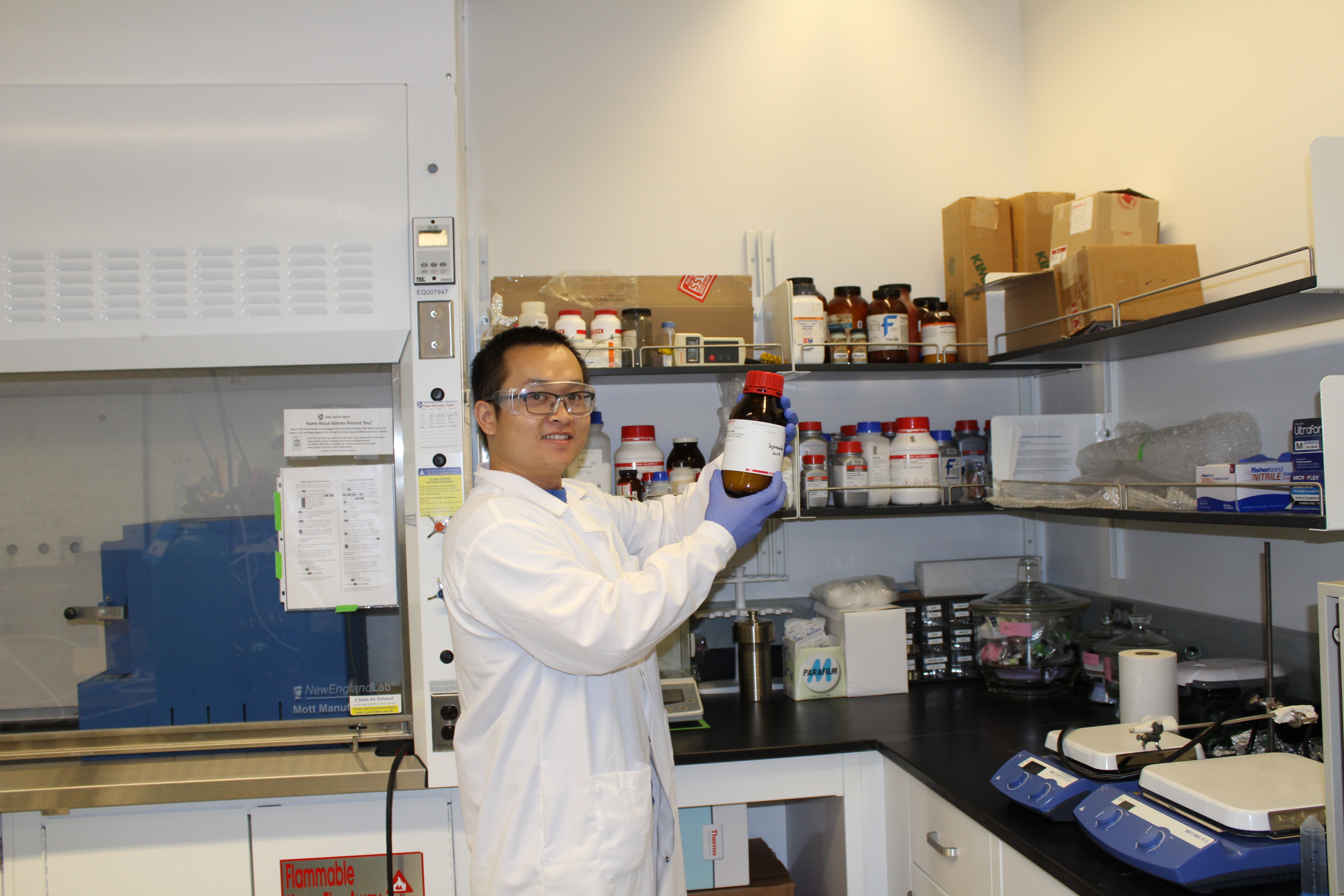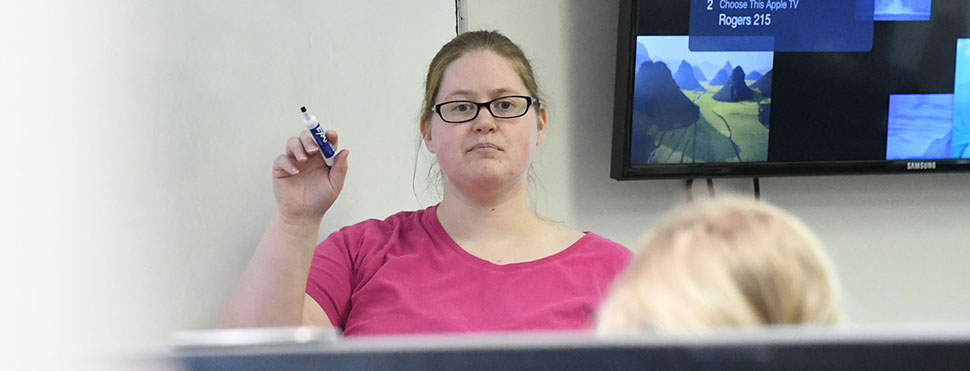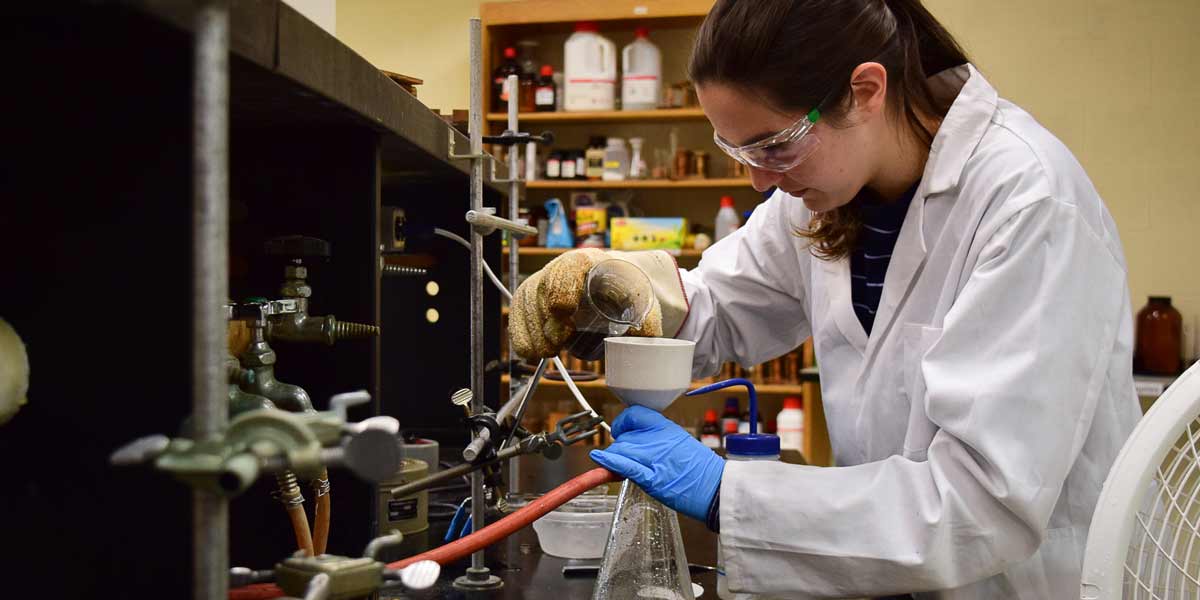Any company concerned with the design, production, or use of materials or energy has need for chemical engineers. BS graduates find employment in production, design, operations, sales, or process development. With further study graduates also move into careers in medicine, law, education, and management. The American Institute of Chemical Engineers and Sloan Career Cornerstone Center have much more detailed information about careers and opportunities. Designed for professionals who wish to pursue a graduate degree, the Master of Science in Chemical Engineering is ideal for outstanding students with degrees in biochemistry, chemistry, engineering, physics and other branches of science.
The 30-credit, non-thesis program includes core chemical engineering courses and electives in polymers, biotechnology, environmental science and electronic materials. Chemical engineers are uniquely equipped to tackle some of the most pressing problems facing society, including those related to energy, health, food, water, and the environment. Building on a foundation of physics, chemistry, math, and biology, chemical engineers invent, design, and deploy the means to produce the materials needed by society, in ways that are safe, economical, scalable, and sustainable. Chemical engineers also use their skills to design and optimize new materials and products, such as water purification devices, drug-delivery patches, biodegradable plastics, or artificial tissues and organs. Moreover, chemical engineering is a professional degree, meaning it provides graduates with a path to management roles where an even greater impact on society can often be realized. Regardless of whether you choose a BEng or MEng, you'll begin your degree program with some corechemical engineering courses, covering fields such as pure and applied mathematics, computing and computer-aided design , and the sciences.
You'll then proceed to study these topics in more depth, with the option to specialize by choosing from a range of elective courses. In later years, you'll move on to more advanced laboratory classes, working with large-scale and industrial equipment. You can also expect to learn about the wider context of chemical engineering, including financial, ethical and environmental issues, and may have the opportunity to study business, finance and management courses. An important part of the Department's mission is to engage in research programs that train graduate students and contribute to the development of fundamental knowledge in the field of chemical engineering.
The department's diverse and aggressive research ensures that its faculty members remain at the technological forefront of their respective areas of specialization. Research areas include biomolecular engineering, nano-materials, environmental reaction engineering, energy engineering, engineering design, and transport & separation processes. Some chemical engineers go into process engineering; others explore opportunities in textiles, materials science, paper science or pharmaceuticals. Graduates of the Master of Science in Chemical Engineering are well equipped for a variety of career paths rooted in a deep understanding of physical and chemical sciences, math and processes.
Many chemical engineering graduates become process engineers when they graduate. This is essentially the application of chemical engineering principles to the optimization, design, operation and control of chemical processes. An energy process engineer uses his/her knowledge to pinpoint opportunities to save energy, propose solutions for more energy-efficient operation, and aid in the design, manufacture and operation of energy infrastructure. You'll need to understand energy supply and demand requirements, engineering economics, the implications of the usage of different types of energy and energy minimization. You'll use a range of technologies and equipment to produce, transfer, distribute, convert and utilize energy and gain a thorough understanding of renewable and alternative energy systems.
Extracurricular activities are a fantastic way for students to exhibit their willingness to pursue interests outside of the classroom. Top schools look for well-rounded applicants and extracurricular activities offer an opportunity for students to stand out to admissions officers. But not every extracurricular activity needs to be focused around chemical engineering; if a student participates in sports, art, music, or is active in their community, here is the place to showcase it. I moved to the USA from India when I was 21 years old to start my graduate journey at the University of Michigan. It was a daunting experience made easy by the students and the professors.
As a graduate student at the University of Michigan, I was surrounded by some of the best minds in their respective fields which helped me develop as an engineer and as a person. I gained a deeper understanding of Chemical Engineering principles and processes through the courses and laboratory research work. Besides the core courses, we also had to choose elective courses which gave me the perfect opportunity to get cross-trained and be well-rounded. I got the opportunity to work in a research lab which allowed me to apply my theoretical knowledge and get some hands-on experience. This exposure to both theoretical and practical knowledge helped me hone my analytical mind. I believe that the culture at the University of Michigan to encourage analytical thinking was crucial to my success both as a student and in the industry.
I currently work at Linde Plc as a Development Specialist in Research and Development, which I got through networking with professionals during career fairs. The majority of my work is designing experiments and analyzing that data to improve the end product. The skills that I learned during my Master's have helped me excel at my job. Within chemical engineering there are many well-paid career opportunities.
You might work as a field engineer, be part of a research team, or become a senior manager within industry. Chemical engineers also secure jobs outside the discipline because of their broad range of skills. Previous graduates have gone into the chemical, process and food industries, and finance and management consultancy, as well as further study. The curricula allow students flexibility in their programs of study and encourages interaction between students and faculty. The undergraduate educational experience prepares students for professional practice and advanced study.
Special programs including our experiential learning program, undergraduate research, and internship opportunities provide professional development skills and experiences and facilitate placement of our graduates in high-quality engineering positions. Entry requirements forchemical engineering degreesusually emphasize a strong background in chemistry and mathematics, while knowledge of other sciences is beneficial. Some background knowledge of the nature of chemical engineering and its various real-world applications is also a good way to prove to university admissions officers that you have a keen interest in pursuing a chemical engineering degree. Our course is designed to develop your engineering skills, in the context of a firm grounding in chemistry.
To ensure this, you'll share your first year with chemists, giving you a good grounding in the subject before gaining a deeper insight into the industrial processes. Subjects you'll cover include process design, health and safety, biological chemistry, biomaterials, inorganic materials and polymer synthesis. The MEng allows students to develop a greater depth ofchemical engineering skills, knowledge in chemical engineering and complete a wider range of project work.
Once you have accumulated the necessary work experience, qualifications, skills and knowledge, an accredited MEng also allows you to gain the status of Chartered Chemical Engineer. Many institutions offer a "sandwich year", in which students spend one year working in industry and/or studying abroad. You may also be able to combine chemical engineering with another discipline such as environmental engineering, business management, foreign languages and subjects in the humanities. One of the first steps of building a college list is to find the schools that offer the major you're interested in, and we've taken that step for students interested in pursuing a degree in chemical engineering. Below is a list of all the colleges and universities in the United States that offer a chemical engineering major. Blending scientific skills with analytic thought, the study of chemical engineering appeals to students who are interested in both math and science—and who have an interest in solving real-world problems.
If this sounds like your high schooler, keep reading to learn why to pursue a chemical engineering degree, glean some insight into how to improve the odds of admission, and see which schools in the U.S. offer a chemical engineering major. College Factual provides higher-education, college and university, degree, program, career, salary, and other helpful information to students, faculty, institutions, and other internet audiences. Inclusion on this website does not imply or represent a direct relationship with the company, school, or brand. Information, though believed correct at time of publication, may not be correct, and no warranty is provided. The displayed options may include sponsored or recommended results, not necessarily based on your preferences.
Chemical Engineering is a popular major and Illinois is the 10th most popular state for students studying this major. 445 of the 14,363 Chemical Engineering degrees earned last year were given by schools in Illinois. This year's Best Colleges for Chemical Engineering in Illinois ranking analyzed 4 colleges and universities that offer a bachelor's degree in chemical engineering.
We look at over 20 factors to determine the top 15% of schools for Chemical Engineering students in Illinois. We design and manage all types of processes that involve chemically and physically transforming matter to make products environmentally friendly and economically viable. We innovate biotechnology and engineer microorganisms to synthesize new drugs, novel protein therapeutics, biocompatible materials for disease treatment, and whole-cell biocatalysts. We develop more sustainable energy resources or solve challenging global problems and use supercomputers and computational modeling and data science to redefine the frontiers of chemical engineering. For students who aspire to pursue a graduate degree and a career in research and development, the units in an area of specialization can be allocated to more fundamental science and engineering courses.
These students are also encouraged to perform independent projects in one of the faculty research laboratories or groups. In the past, chemical engineering was known to cover just oil refining and petrochemical production, but the industry is constantly progressing and study will be influenced by advancement in the field. New and improved materials are always being developed, so students will benefit from tuition in fields such as nanotechnology, fuel cells, fabric development, mineral processing and bioengineering.
But core subjects include fluid mechanics, mass and heat transfer, thermodynamics, plant design, process systems, process economics, process analysis and process operations. During the first year and a half of the program, the senior academic advisors in the Office of Undergraduate Education, School of Engineering and Applied Sciences, located in 410 Bonner Hall, assist students in choosing courses. Throughout the undergraduate experience, this office provides support regarding general education requirements, transfer credits, and basic math and science coursework. During the fall semester of the sophomore year students obtain a CBE faculty advisor.
A CBE staff or faculty advisor should be consulted for issues relating to CBE courses and careers. The CBE Director of Undergraduate Studies should be contacted for help with specialized issues, such as study abroad. UA chemical engineering students use their knowledge of chemistry, math and physics to solve problems in areas such as the design and manufacturing of consumer products, production of food, and provision of clean water and air.
A food processing engineer works in the development of food products, combining science, engineering, chemistry and microbiology. You'll use the latest products and technologies to design techniques for food creation, processing, preservation, packaging, distribution and improvement. You'll use your understanding of heat transfer and fluid flow principles during your work, and also use simulation tools to aid designing and troubleshooting process optimization. You'll likely work as part of a larger team of engineers and scientists, and you may be employed by food manufacturers or work alongside experts from the agricultural and food processing industries. You may be responsible for all or part of food production, perhaps specializing in food additives, food safety, nutrition, packaging, preparation methods/ingredients, or research of chemicals found within food. Many professional fields rely on chemical engineering skills, knowledge and expertise, from environmental and energy to medical, gastronomical and technological.
Indeed, chemical engineering is essential to pretty much every area of human activity – as a graduate in this subject, you can choose to apply your knowledge within an impressive variety of sectors. For those interested in something more advanced, UIUC also offers 2 different higher degree levels in chemical engineering, the most popular of which is a Master's Degree. Students from the chemical engineering degree program at University of Illinois at Urbana-Champaign earn $3,250 above the average college grad with the same degree shortly after graduation. For those interested in something more advanced, Northwestern also offers 2 different higher degree levels in chemical engineering, the most popular of which is a Doctor's Degree.
Students from the chemical engineering degree program at Northwestern University make $9,650 above the average college grad with the same degree shortly after graduation. As you prepare to start your education, you may wonder what you'll learn as a chemical engineering student. Your degree will offer you a solid base of theoretical knowledge with courses like Introduction to Polymers, Circuit Theory, and Principles of Chemical Engineering. At the post-graduate level, theory courses include Fluid Mechanics for Chemical Engineers and Transport Phenomena. If you're ready to start a chemical engineering career with a great education, there are five schools in Tennessee that can help you. All five schools offer Bachelor's degrees and Master's degrees, and four schools have doctoral degree programs.
To leverage synergies and collaboration between science and engineering programs, the College of Science and Engineering was established in 2019 from the merger of these two Colleges. The primary purpose of these changes has been to enhance the learning environment of our students and to position us to be on the leading edge of science and engineering education. We have created an environment in which there are strong interdisciplinary interactions between faculty in engineering, mathematics and the sciences. These faculty members work together seeking areas for enhancement in curricula, assessment, research, learning, advising, and the many other processes that impact the quality of the educational experience. With a new interdisciplinary organization, these interactions occur naturally, and collaborations are providing synergistic transformations. The administrative structure of the College of Science and Engineering is dynamic, breaking down traditional barriers to innovation and effective resource use.
Its essential elements are multidisciplinary teams and interactions, rather than specific organizational lines and boxes. My Master's degree stands as proof that I have survived some very tough courses, training, research projects, and all other challenges this program has set up for me. Master's degree training does not suffice all the requirements of your career, but it measures the level of your learning ability and earns you a better chance to start your first position so that you can continuously learn on the job. Another thing I appreciate about the program is that it prepared me for many opportunities I didn't even know. I was very nervous about my first job as a petrophysicist because I thought I knew nothing about rocks. But as I started, I realized that I can borrow what I've learned from courses such as Transport Phenomena, Fluid Mechanics, and Reaction to understand the fluid behaviors in rocks.
Similar things also happened when I began to build a new research center in 2017. My recollection of being a GSI and assistant lab supervisor for CHE360 came back to my aid and brought me many great ideas to design my lab. I think the experience from the Master's program truly empowered me with the knowledge and confidence to take on new tasks throughout my career. The Chemical Engineering Program at the University of Minnesota is accredited by the Engineering Accreditation Commission of ABET (). The department graduates about 100 students with bachelor's degrees in Chemical Engineering each year. The core courses in the Chemical Engineering program are team taught by several faculty members.
The organizing professor lectures three times a week to the entire class, and the class is split into smaller recitation sections for twice-weekly discussion and problem-solving meetings with a faculty member. Our team teaching approach puts the students and faculty in closer contact to the mutual benefit of both. The program at UB is broadly based to prepare graduates for diverse roles as engineers, and to prepare them for employment in a vast array of industries.
Most graduates enter the work force immediately, but some continue on to graduate study and careers in research, and a few pursue degrees in medicine, business or law. A new co-op program provides an option to gain industrial experience before graduation, and many students conduct research with the Department's award-winning faculty. In one of Canada's top Chemical Engineering programs , you'll enhance your knowledge of physics, chemistry, biology, and math with engineering design and problem-solving skills. You'll learn to transform raw materials into useful products as well as to design and control complex physical and chemical processes. The honor society Omega Chi Epsilon promotes creativity, entrepreneurship, professionalism and camaraderie among chemical engineering students.
The American Institute of Chemical Engineers hosts social events and provides opportunities for mentoring, tutoring and professional networking. And, in the UA Home Brew club, students put chemical engineering skills to the task with craft brewing techniques. While the specific activities will depend on the role and sector in which you work, most chemical engineering jobs likely require working closely with a team of chemical engineering technicians and engineers. Depending on your role, you might be working solely in the lab, office or processing plant, or divide your time between the three.
Candidates with an aptitude for leadership may also move up to become plant managers or company executives. Also called reaction engineering or reactor engineering, chemical reaction engineering deals with chemical reactors such as those found in industrial plants. Chemical reaction engineering is the management of industrial reactor/plant processes and conditions to ensure optimal reactor/plant operation.
The term is frequently used specifically in relation to catalytic reaction systems where a homogenous or heterogeneous catalyst is present in the reactor. You'll draw upon many topics within chemical engineering, including the others explored here. Typically, chemical engineering courses are taught through a combination of lectures, tutorials, seminars, computer practice sessions, extensive practical laboratory work and project work .
Your institution may also be able to provide classes by industry professionals, who will give an insight to current industrial practices and concerns. Many institutions accept a range of entry routes into chemical engineering – you can enter from a natural sciences background, or through engineering or computer sciences. Some institutions are even more flexible, accepting students from all disciplines. And, if you don't have the required grades or subjects needed for entry, some institutions offer a foundation course to help you get up to speed with the required skills and knowledge.



























No comments:
Post a Comment
Note: Only a member of this blog may post a comment.